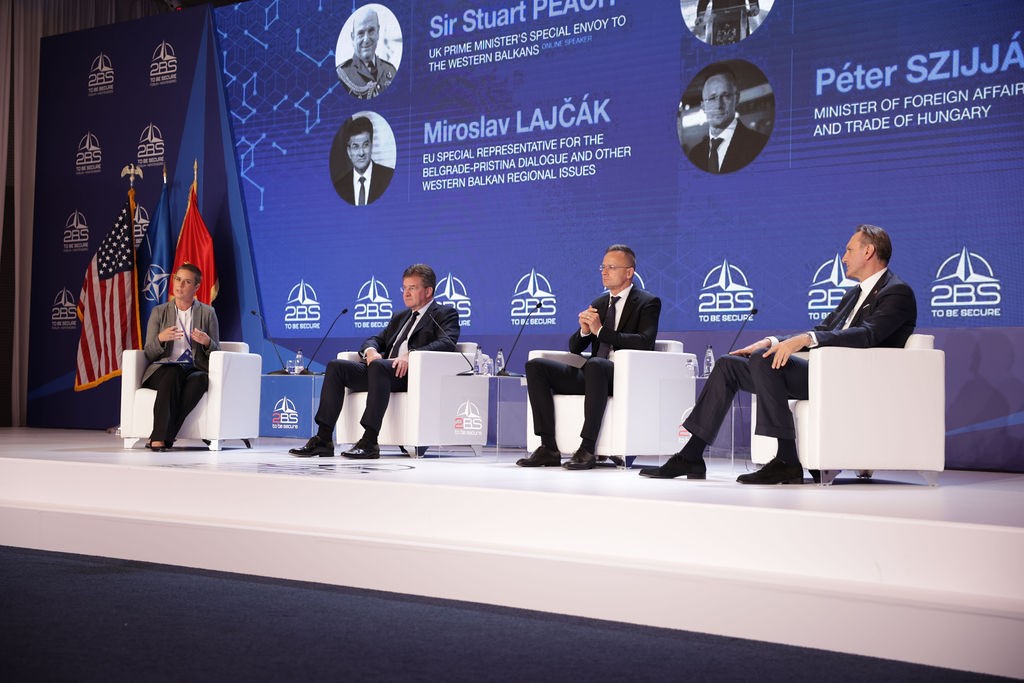At the panel dedicated to the future of the Western Balkans, the Special Envoy of the British Prime Minister for the Western Balkans, Sir Stuart Peach, said that the existing security should not be taken for granted. He said that the risks posed by Russia’s invasion of Ukraine are very real and burden the region’s past. There is also the risk of organized crime, which reduces the possibility of stability. We have to be brave in our activities, Peach pointed out.
Sir Stuart Peach also said that membership in NATO is important for preserving security and that a common approach is needed for a common future.
Miroslav Lajčák, EU Special Representative for the Belgrade-Pristina Dialogue and Western Balkans, said there is no reason to be afraid of the European Political Community because it is not a substitute for the EU. No one thought to replace that process with something else. President Đukanović made it clear. The war in Ukraine has changed a lot and brought many bad things, but one good thing is that there was an awakening on the side of the EU among those who believe that the Balkans is already in a safe place and they can wait. Now they realized that they should see the Balkans as soon as possible in the E.U. because it is not known how long it will be stable, said Lajčák.
He pointed out that technical criteria are important for enlargement but that compliance with E.U. policy and its standards is much more important. He also reminded that Moldova, Georgia, and Ukraine received candidate status, but also the fact that the Balkans is not enthusiastic about that idea.
Here in the region, it was not fully appreciated because people were asking legitimate questions about what does it mean for the Western Balkans. Europe is not turning its back on the Balkans, and the fact that we are expanding to the East does not mean that this will have a negative impact on the Balkans, said Lajčák.
He also assessed that the Western Balkans is in a worse condition today than five years ago. My advice to the region is: let’s think less about what the EU wants and focus on achieving our tasks, concluded Lajčák.
Hungarian Minister of Foreign Affairs Péter Szijjártó said that his country stands for enlargement, considering it to be the most important policy of the EU. Considering all security issues and economic challenges, it is evident that the EU is weakening itself. The EU needs to be strengthened, and I think there is agreement on that issue. There is no consensus on how we can strengthen it, but I believe that if we increase the membership, we will be stronger. If we could include the Balkans in the EU, we would be stronger. Currently, the situation is such that Europe needs the Balkans more than the Balkans need the EU. Failure to speed up the accession process represents a security challenge for Europe, said Szijjártó.
The Head of Montenegrin diplomacy, Ranko Krivokapić, said Montenegro must fulfill the agenda. The rule of law is the main task; you don’t have a country if you don’t have one. We are still a society in transition, without a legacy of institutions that think about our protection and do not think in the long-term perspective, said Krivokapić. He said that there is a cash-and-carry approach in the Balkans. This is precisely why we have to send a message that we will have to eradicate corruption in the larger constellation of memberships, Krivokapić pointed out.
SPEAKERS:
Sir Stuart PEACH, U.K. Prime Minister’s Special Envoy to the Western Balkans ONLINE SPEAKER
Ranko KRIVOKAPIĆ, Minister of Foreign Affairs, Montenegro
Miroslav LAJČÁK, E.U. Special Representative for the Belgrade-Pristina Dialogue and other Western Balkan regional issues
Péter SZIJJÁRTÓ, Minister of Foreign Affairs and Trade of Hungary
Moderator: Jasmina KOS, Presenter, and Reporter, Al Jazeera Balkans
